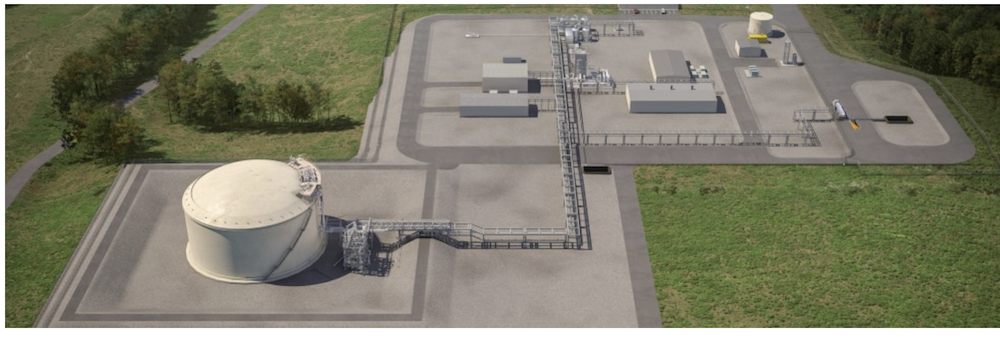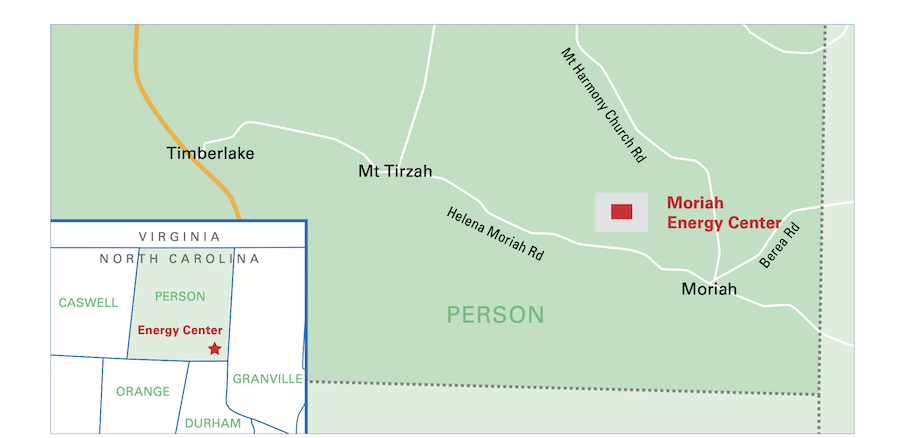Person County residents suing commissioners over rezoning for Dominion LNG plant

Dominion Energy provided this photo illustration of the proposed liquified natural gas facility -- LNG, for short -- in southeastern Person County. The large tank can hold 25 million gallons of LNG.
The Tomato Lady. An amateur astronomer. A doctor-turned-organic farmer.
Eight Person County residents have sued their county commissioners over an “arbitrary and capricious” rezoning that will allow a large liquified natural gas facility to be built near the southeastern community of Timberlake. The project would consume roughly 485 acres, with 50 to 60 accommodating the actual footprint of LNG site. The remaining area would serve as a safety buffer in case of a leak or explosion.
The Southern Coalition for Social Justice, which is representing the residents, is asking a court to nullify the rezoning. Attorney T.C. Morphis, who represents the county, has filed a motion to dismiss the case. A hearing is scheduled for July 15 in Person County.
The proposed Moriah Energy Center, owned by Dominion would store the gas in two 25 million-gallon tanks at 260 degrees below zero. At peak demand times, usually during the winter, the gas would be vaporized and re-injected into the pipeline system. It’s unknown how often that would occur, although it could be as few as eight days a year.
Dominion would source the gas from fracking operations outside North Carolina and transport it via their transmission pipelines. Alternately, the LNG would be shipped to the Moriah Energy Center by tanker truck.
These large LNG facilities require significantly greater quantities of refrigerants to liquefy the natural gas than the amount typically used at a peak shavers or small-scale facilities, according to the federal Pipeline and Hazardous Material Safety Administration.
The plaintiffs own property adjacent to the planned Moriah Energy Center, “which will destroy the rural character of their neighborhood and Person County” and subject them to “increased pollution, noise, traffic, toxic and hazardous air emissions, endangered and threatened species impacts, water resource impacts and the loss of use and enjoyment of their properties,” according to court documents. The concrete and pavement, land clearing and groundwater usage would also harm water quality and quantity, the plaintiffs allege.
The location of the Moriah Energy Center, in rural Person County, about two miles from the Durham and Granville county lines. (Map: Dominion)
James Dykes co-owns the Potluck Community Farm, which practices organic and regenerative agriculture, and where raises pigs, goats, cattle and other animals on pasture. He had planned to build a residential eco-village on part of the property, but “fewer people will be interested in living in a farming neighborhood overshadowed by the industrial operations” of the Moriah Energy Center, court documents read.
Several other plaintiffs raise bees, grow nursery plants and vegetables; at least two of the plaintiffs say they have chronic respiratory conditions.
In addition to leaking methane, a potent greenhouse gas, LNG plants emit carbon monoxide, sulfur dioxide, and volatile organic compounds, according to the Environmental Health Project. Studies have shown that these pollutants are associated with a range of health impacts, including headaches, coughing, dizziness, and other respiratory illnesses. They can also irritate skin, eyes, nose, and lungs. Long-term exposure to these pollutants can lead to heart disease, certain types of cancer, and damage to the reproductive system and internal organs, according to the project.
The lawsuit also argues the Person County Commissioners erred on administrative grounds. For example, they did not notify by certified mail Camp Butner, a military base within five miles of the Moriah Energy Center, as legally required. Nor did the commissioners properly notify all of adjacent property owners of a public hearing within the legally required 10 days, the lawsuit alleges. Kristopher Clayton, who lives 78 feet from the rezoned property, alleged he did not receive his notice until five days before the commissioners’ public hearing.
Because the commissioners rezoned area from Rural Conservation and Residential to General Industrial, if the Moriah Energy Center is not built, other heavy manufacturing could be sited there.
Dominion Energy has tried, unsuccessfully, to appease neighbors. In mid-April, Roxboro Area Chamber of Commerce officials held a meeting at the Golden Corral, where a Dominion spokesperson explained the project to a standing room-only crowd. However, the spokesperson offered no new information about the project and declined to take questions from the audience. Concerned residents say they have submitted more than 100 questions to Dominion, but have not received meaningful, if any, response.
The post Person County residents suing commissioners over rezoning for Dominion LNG plant appeared first on NC Newsline.


